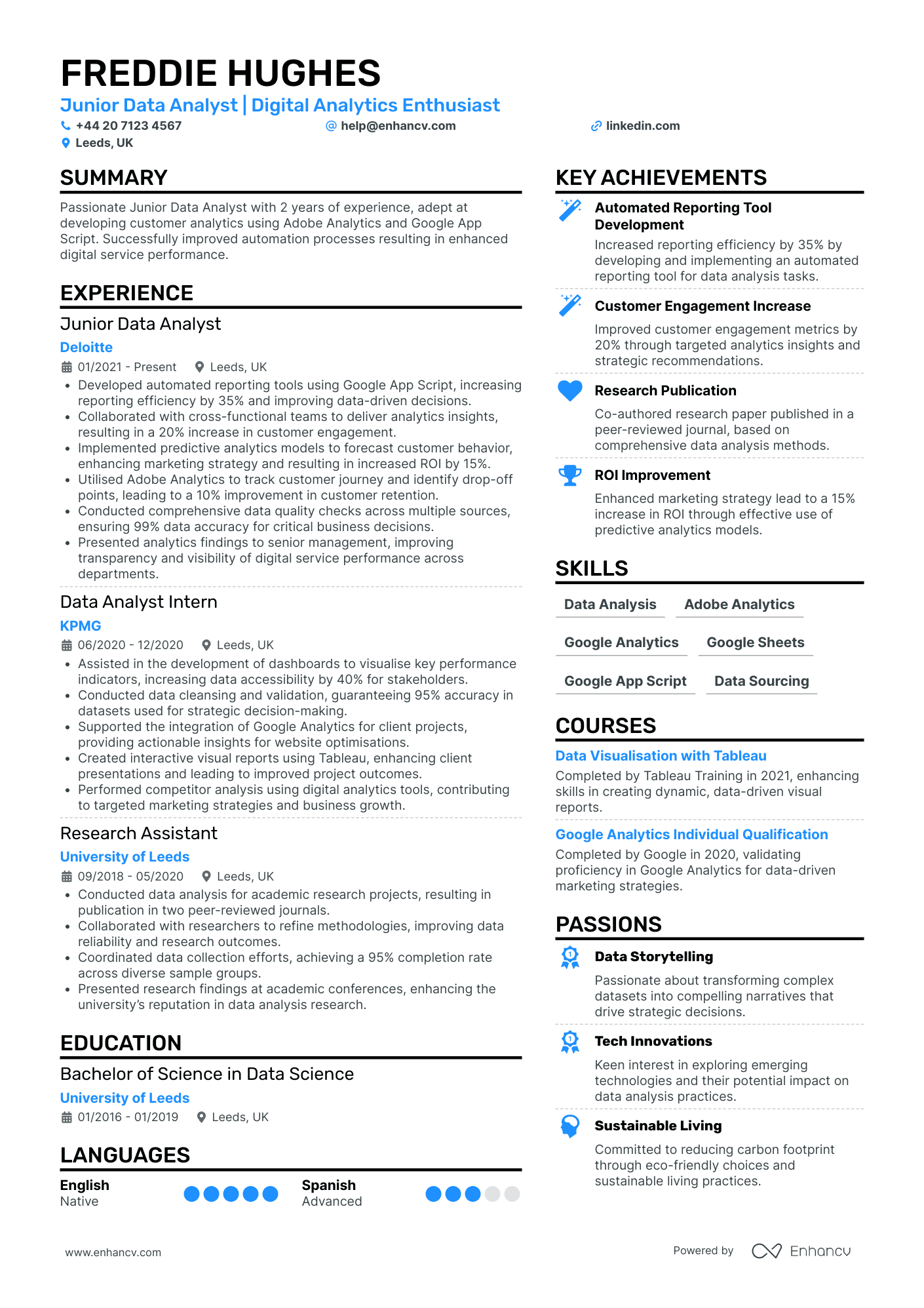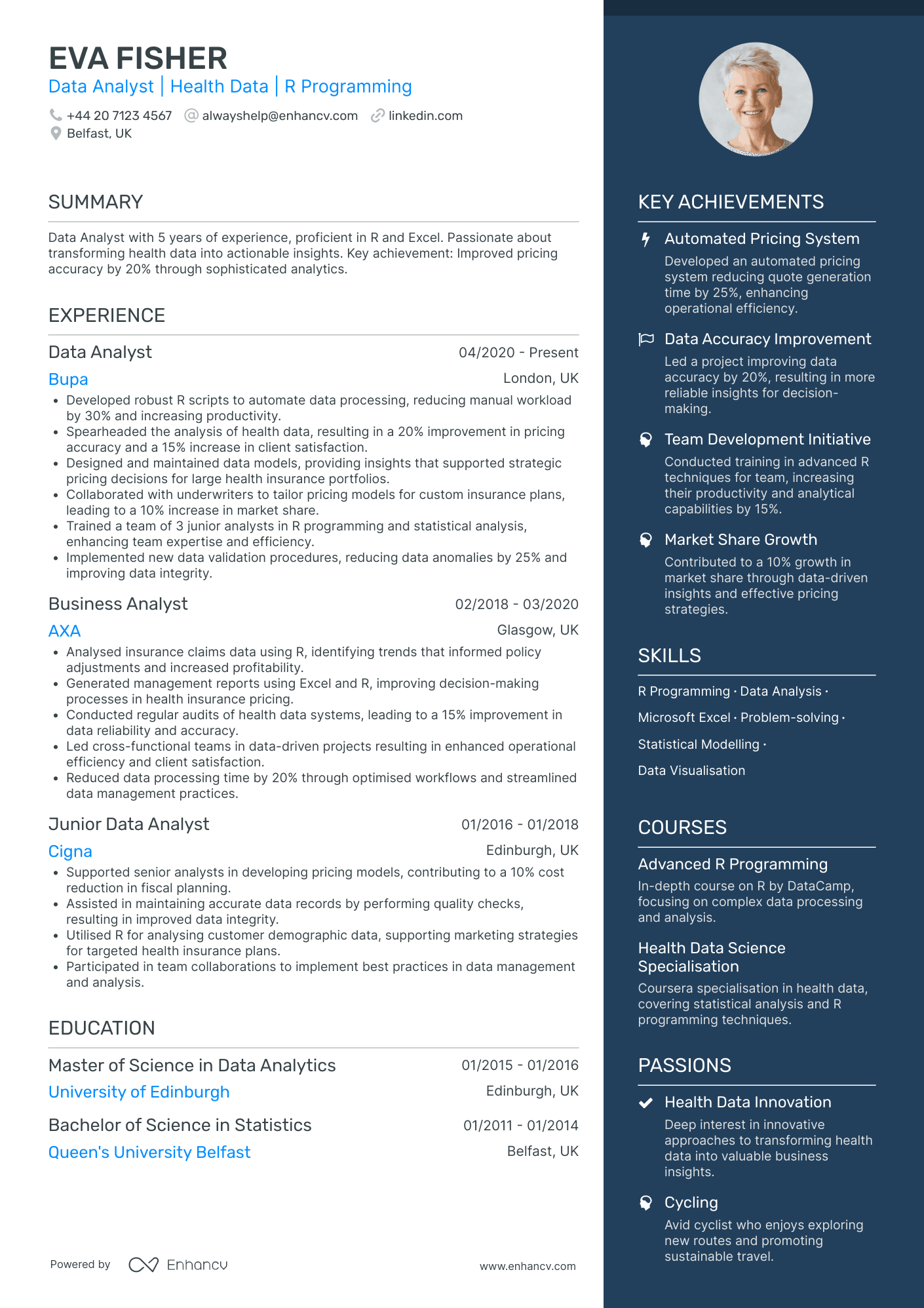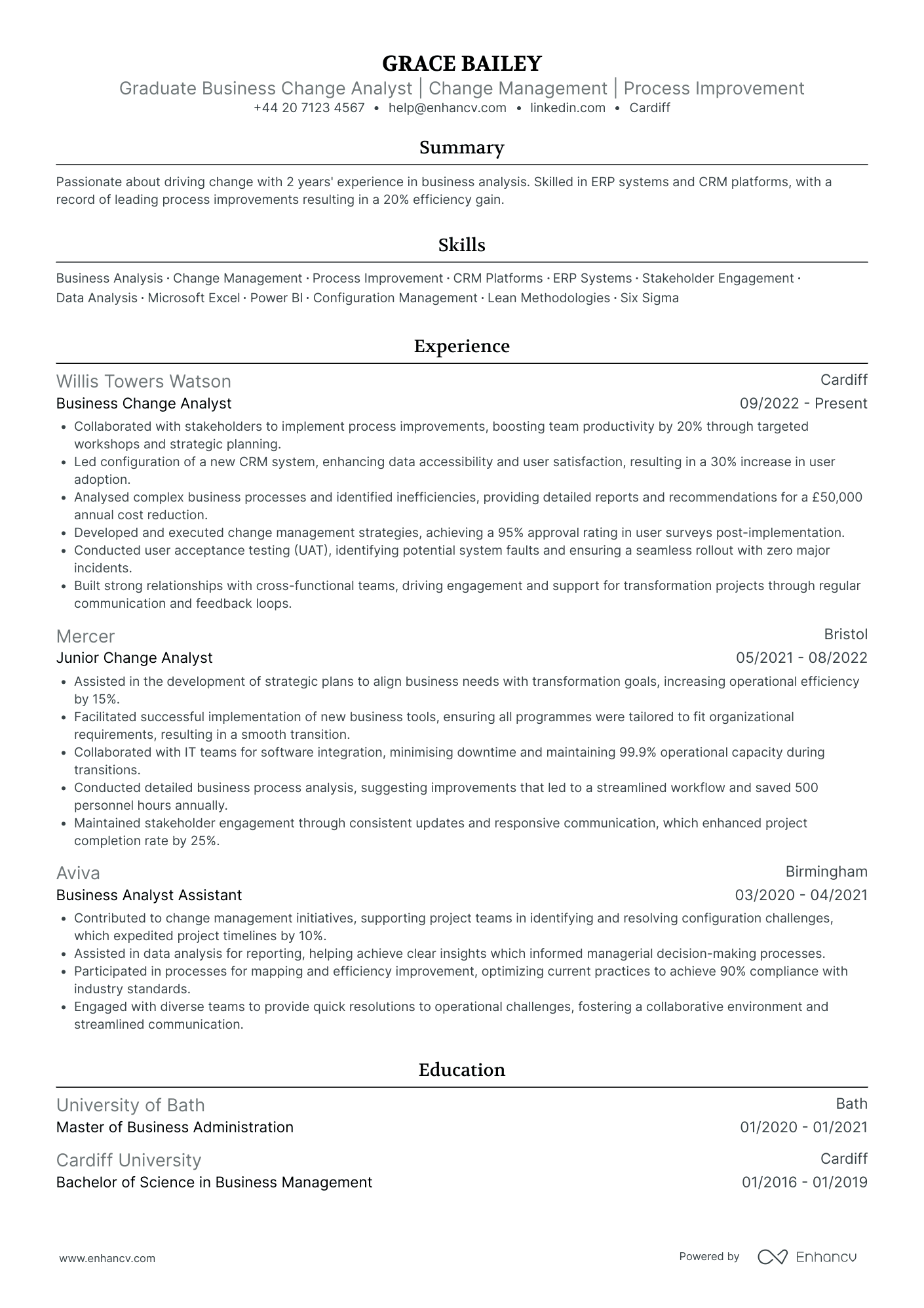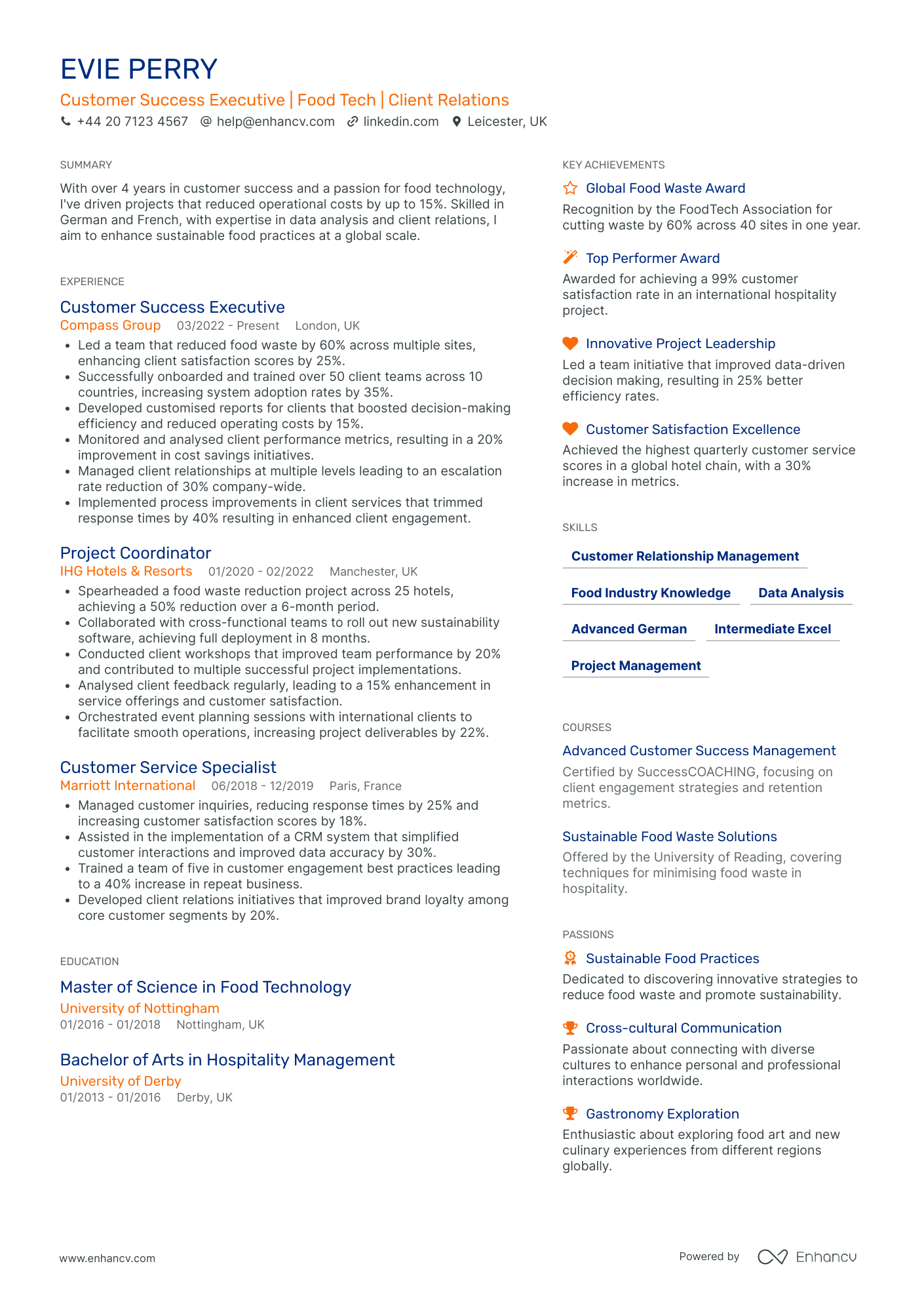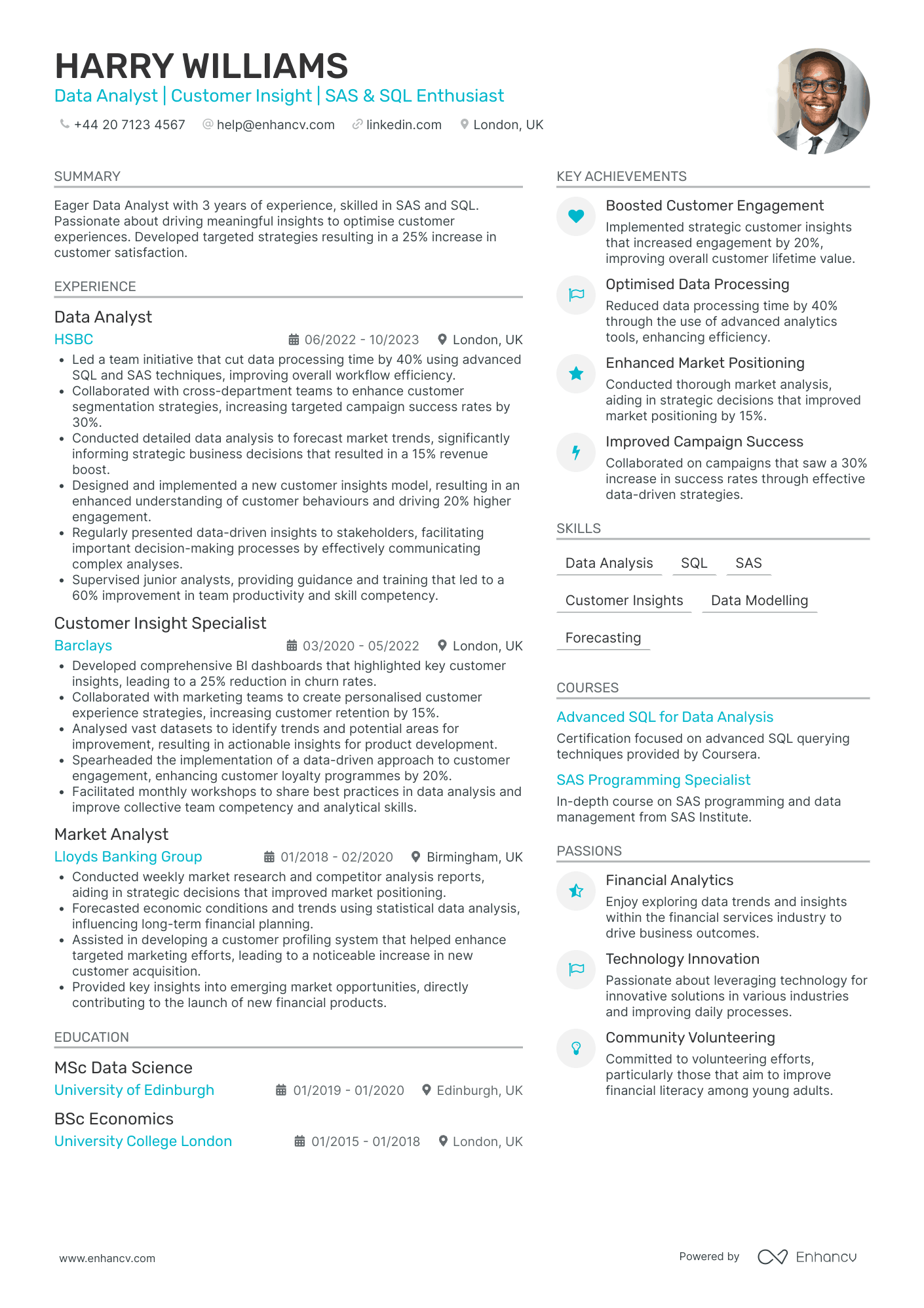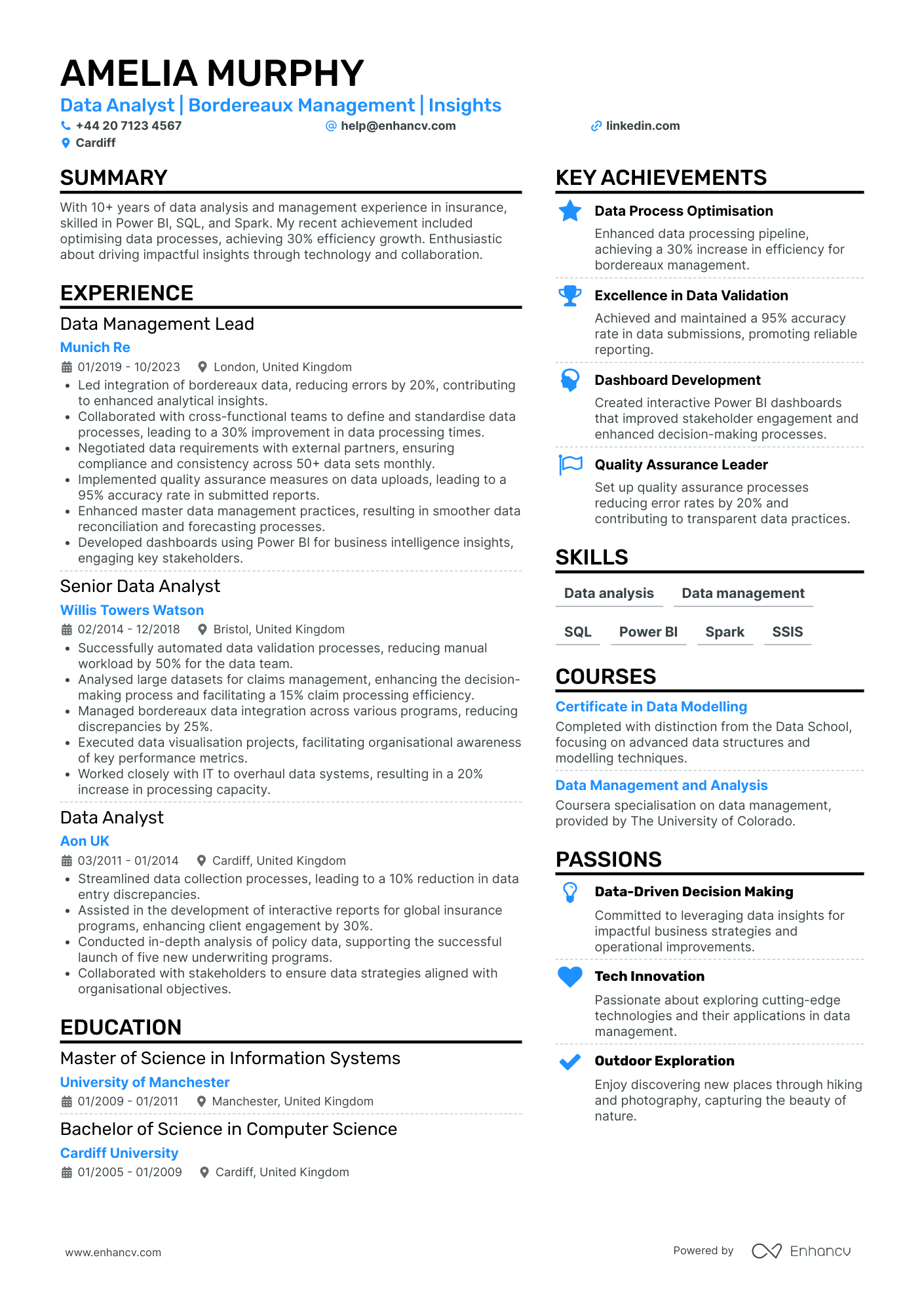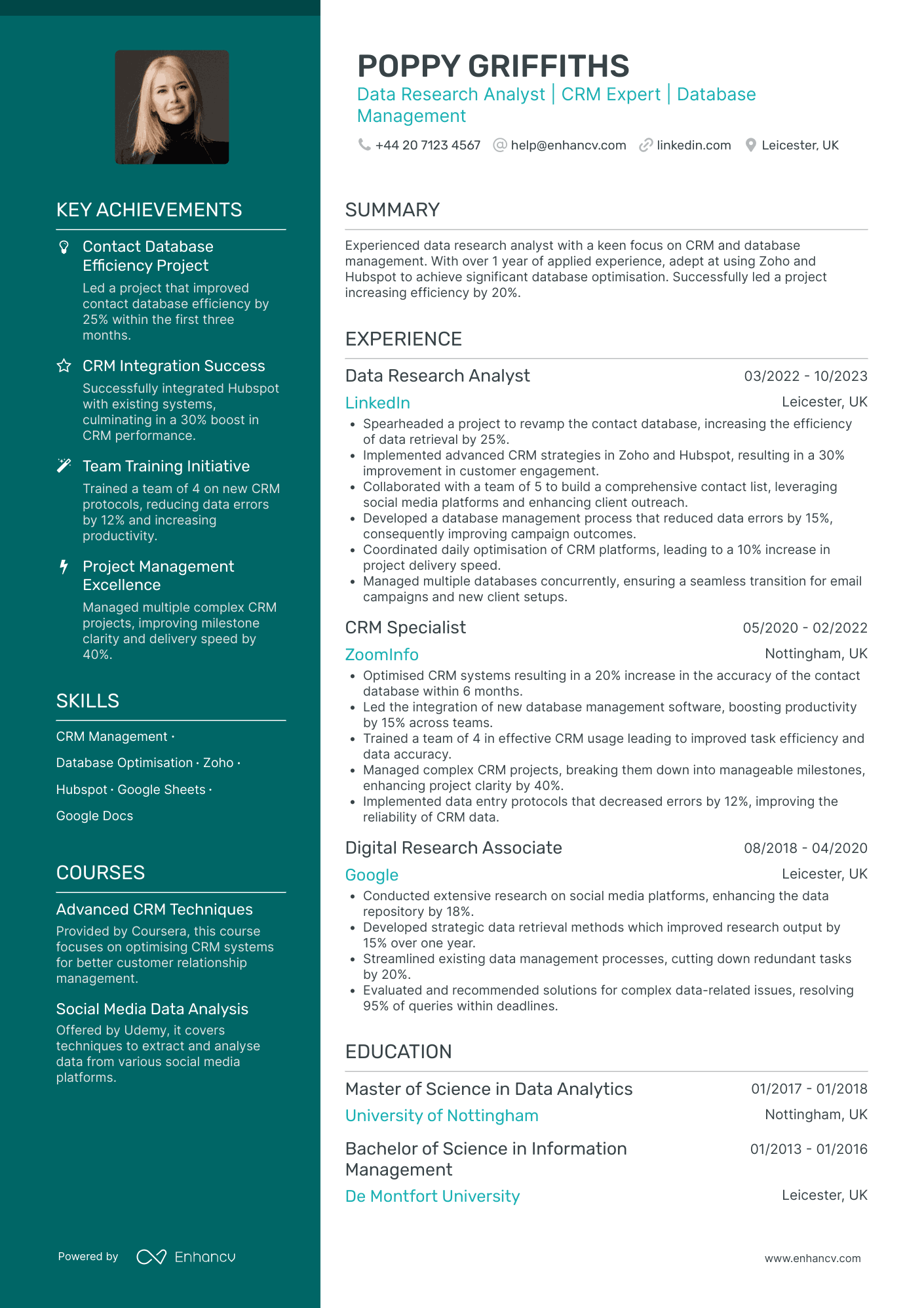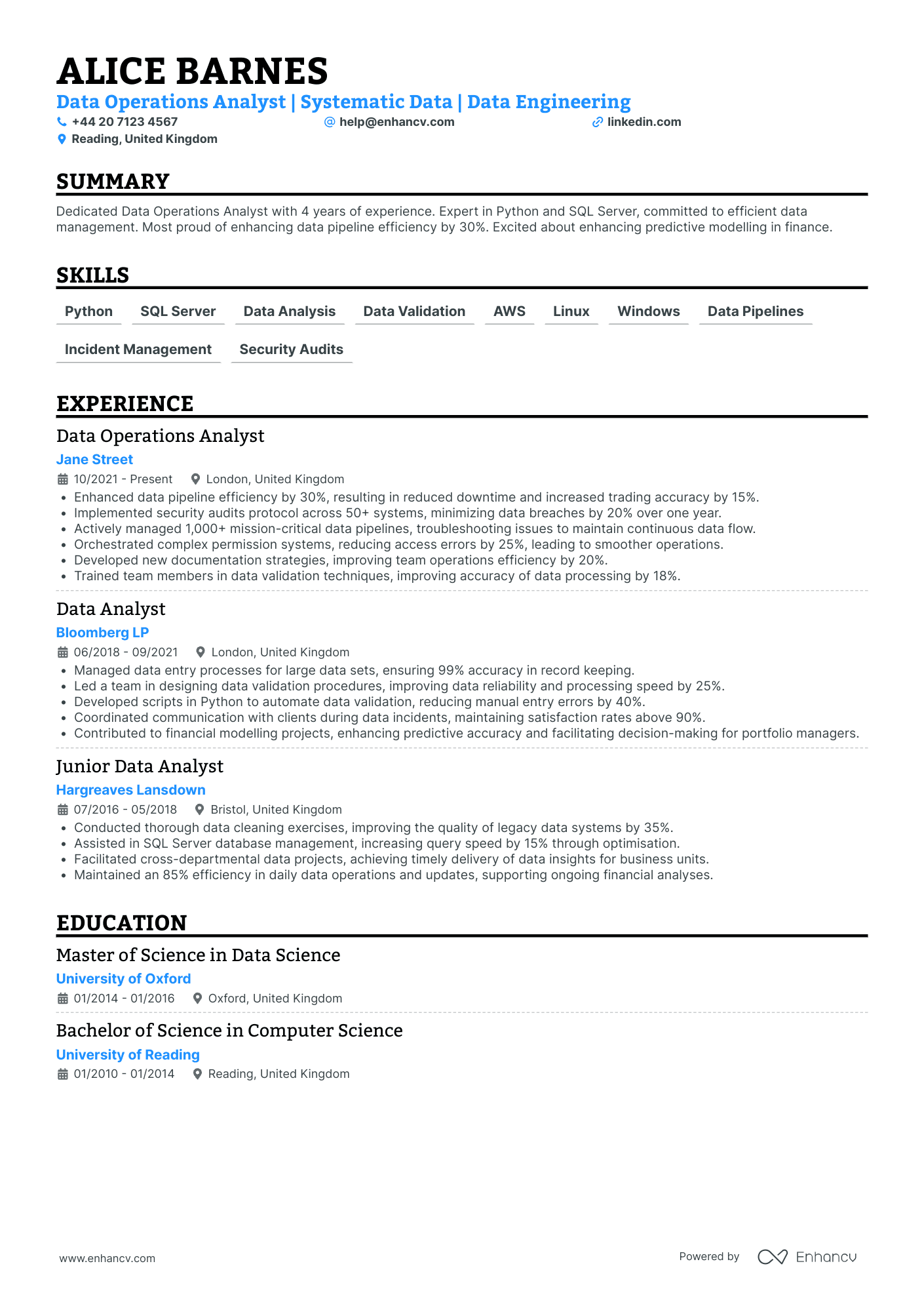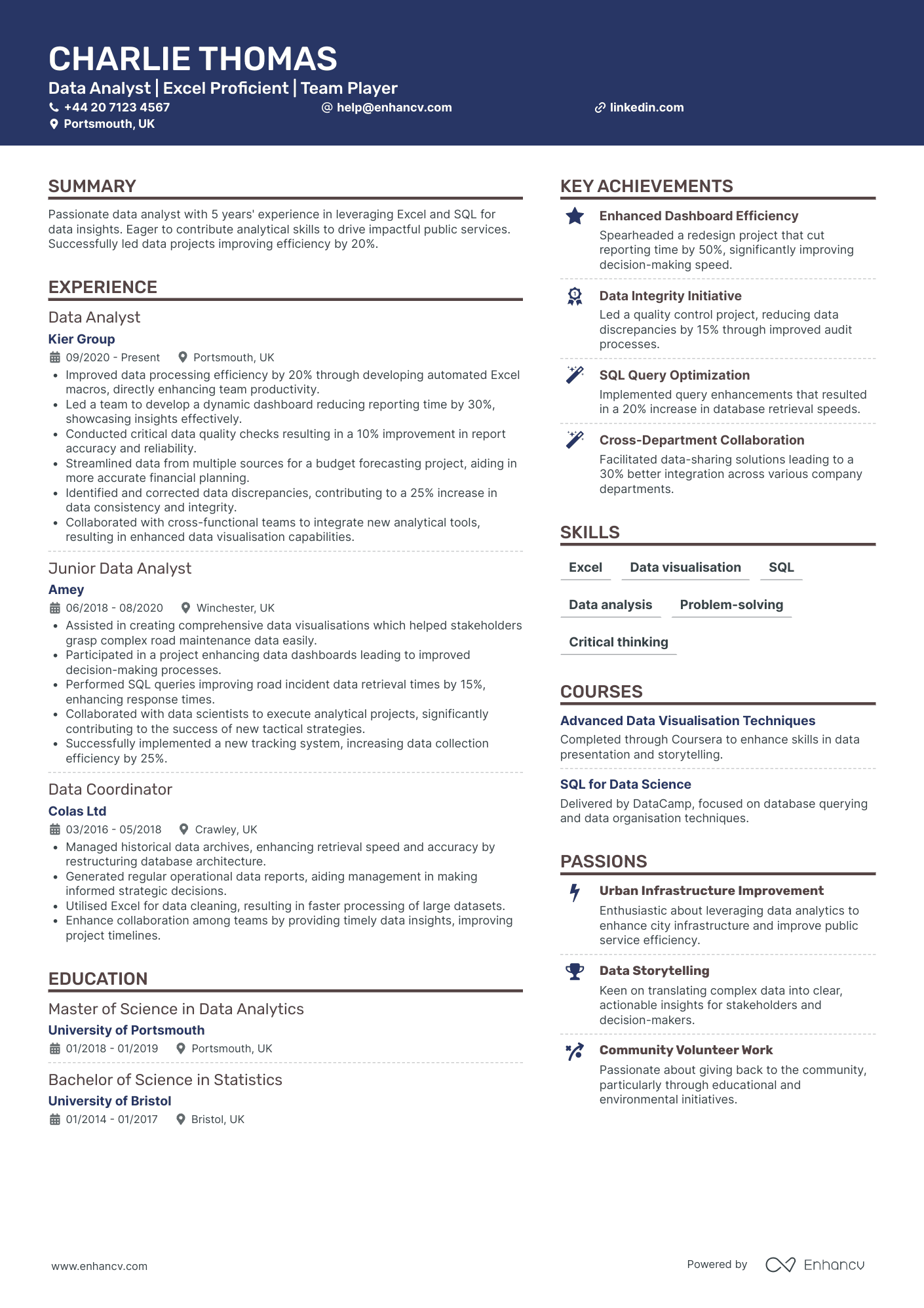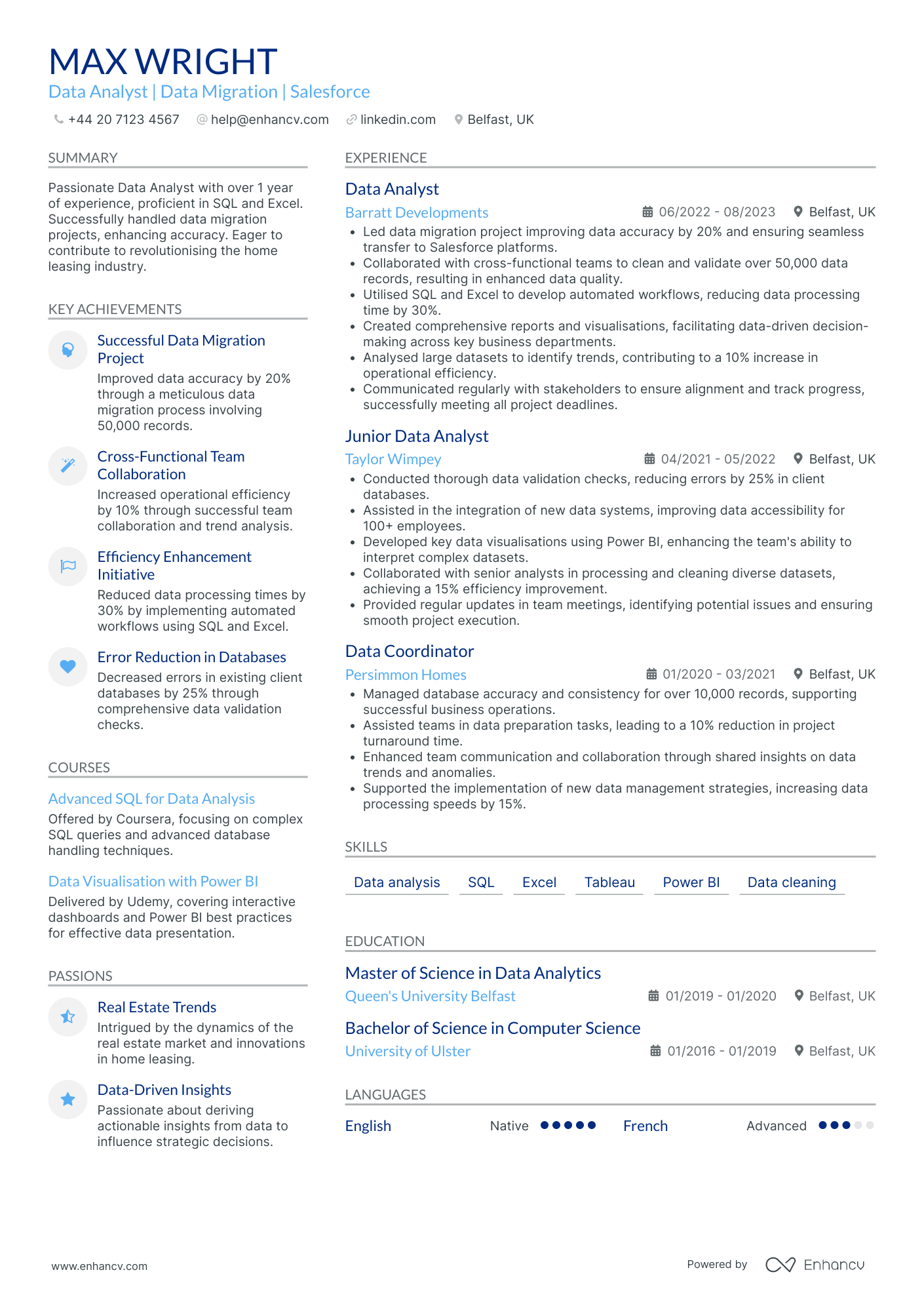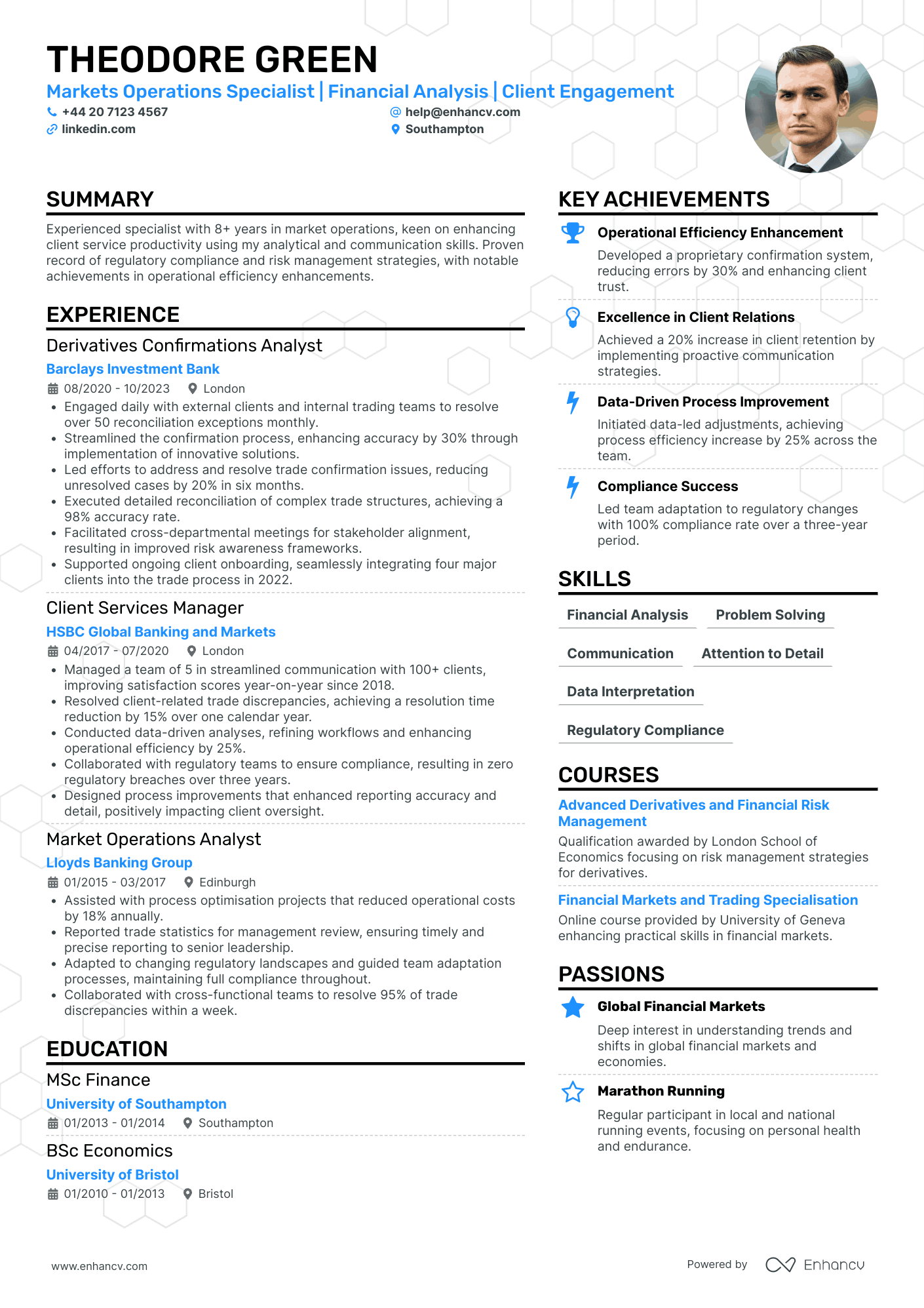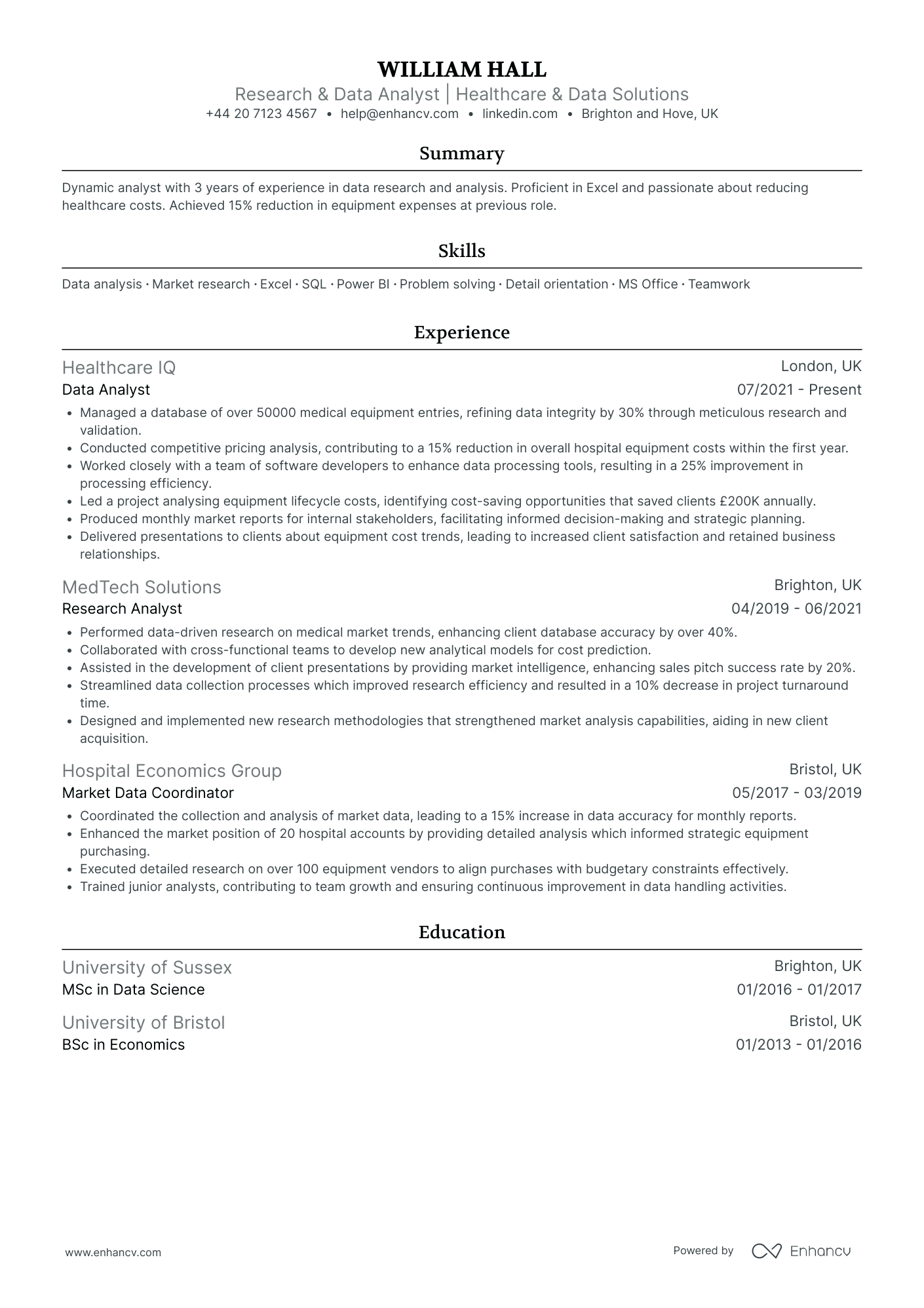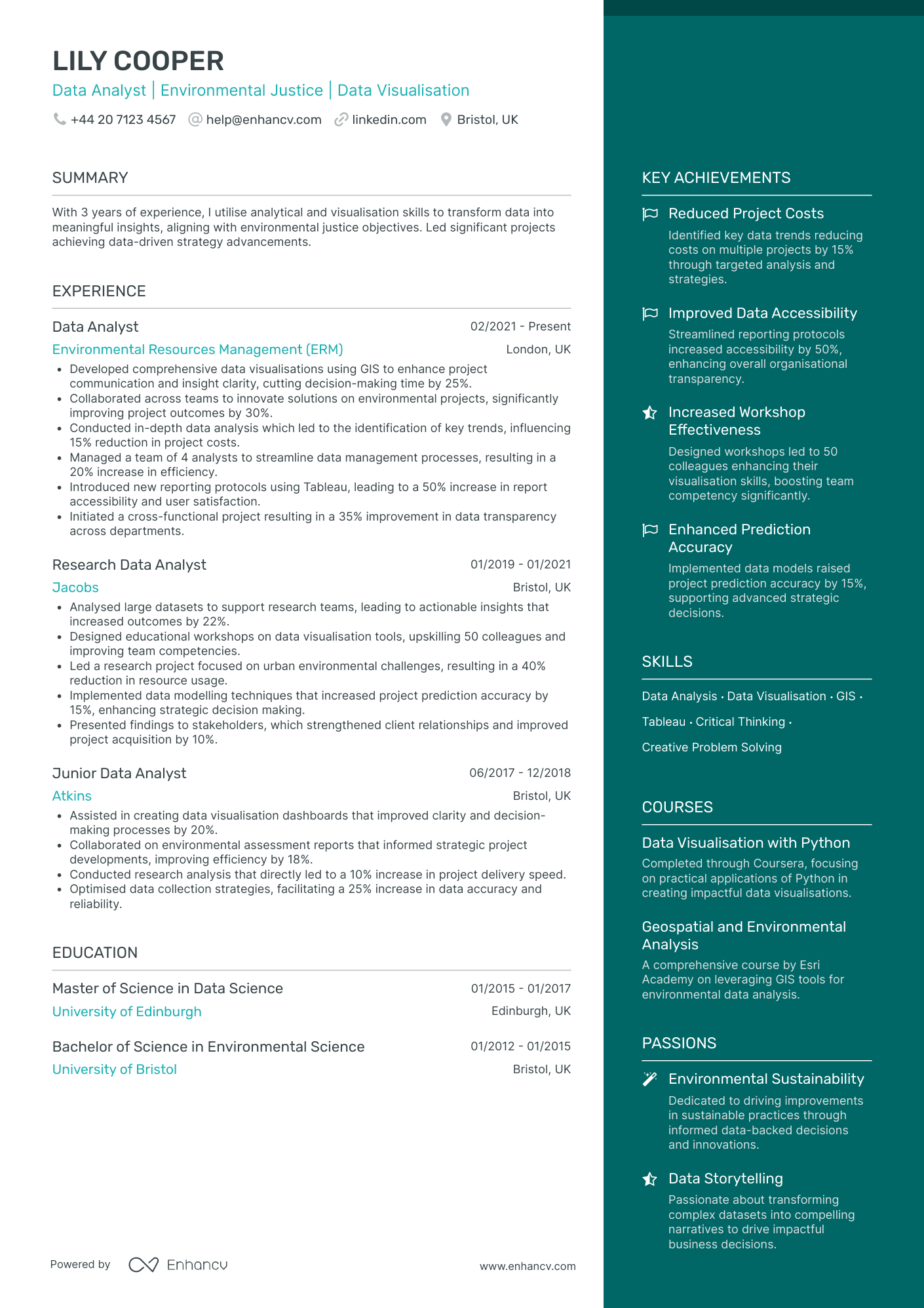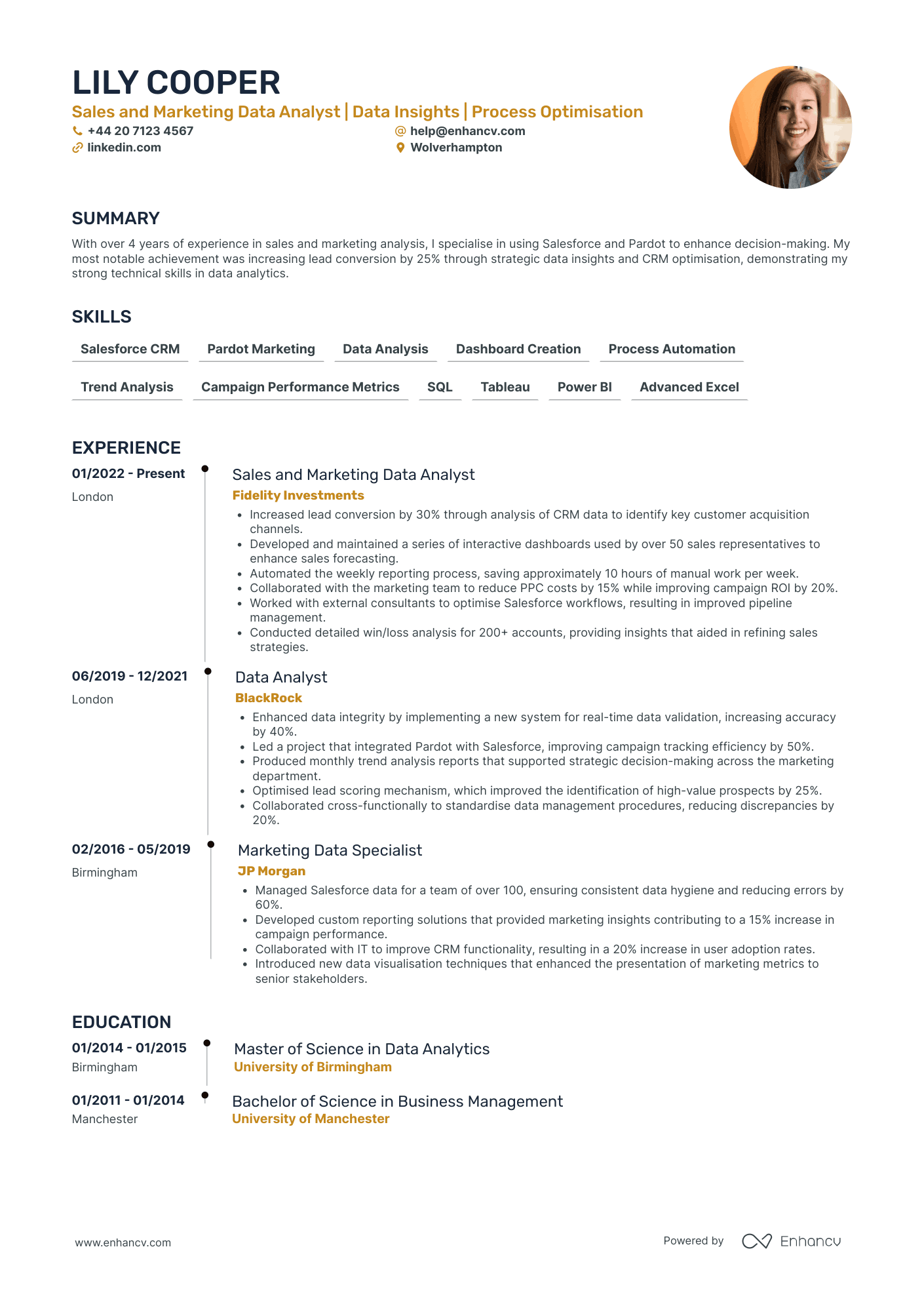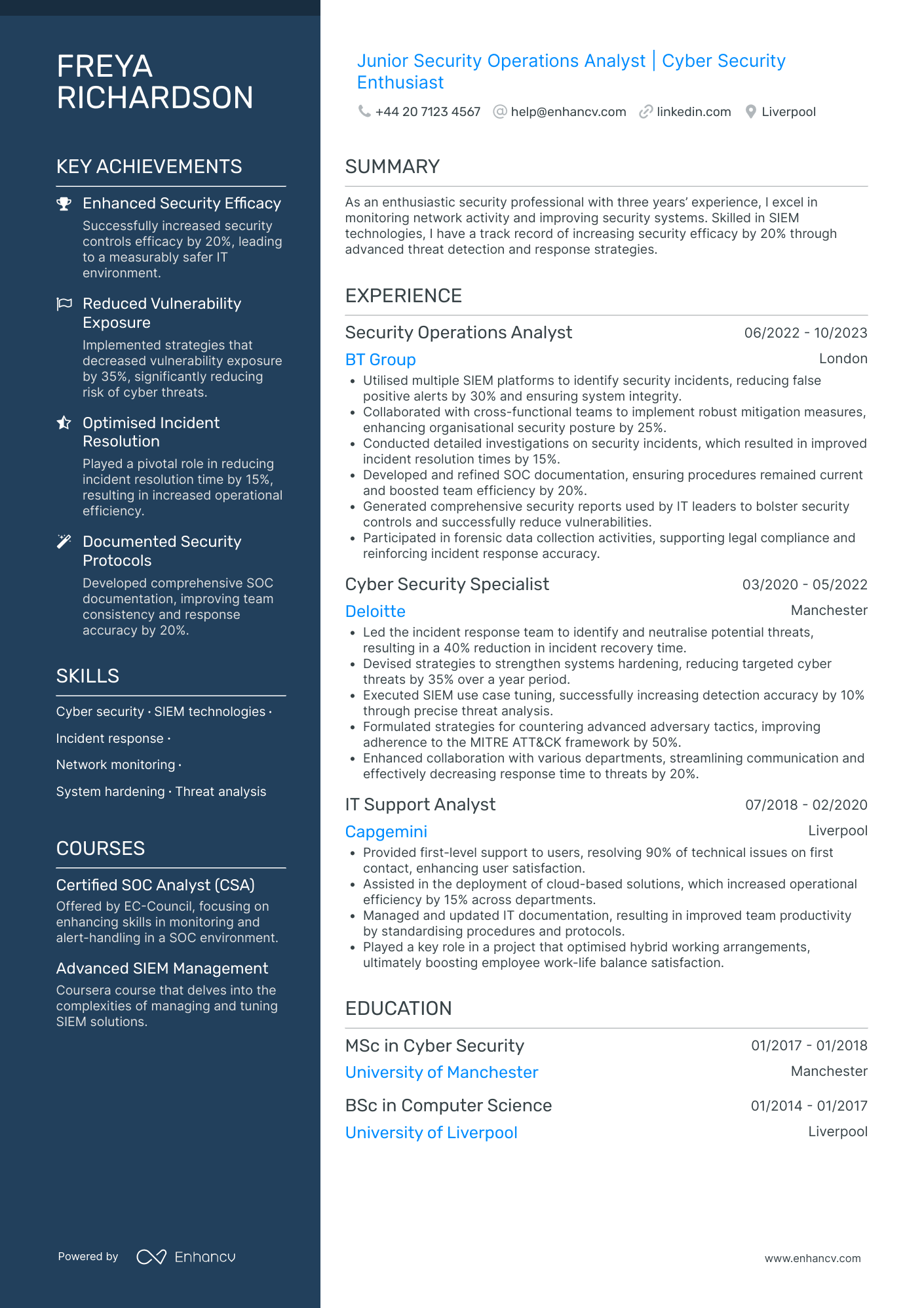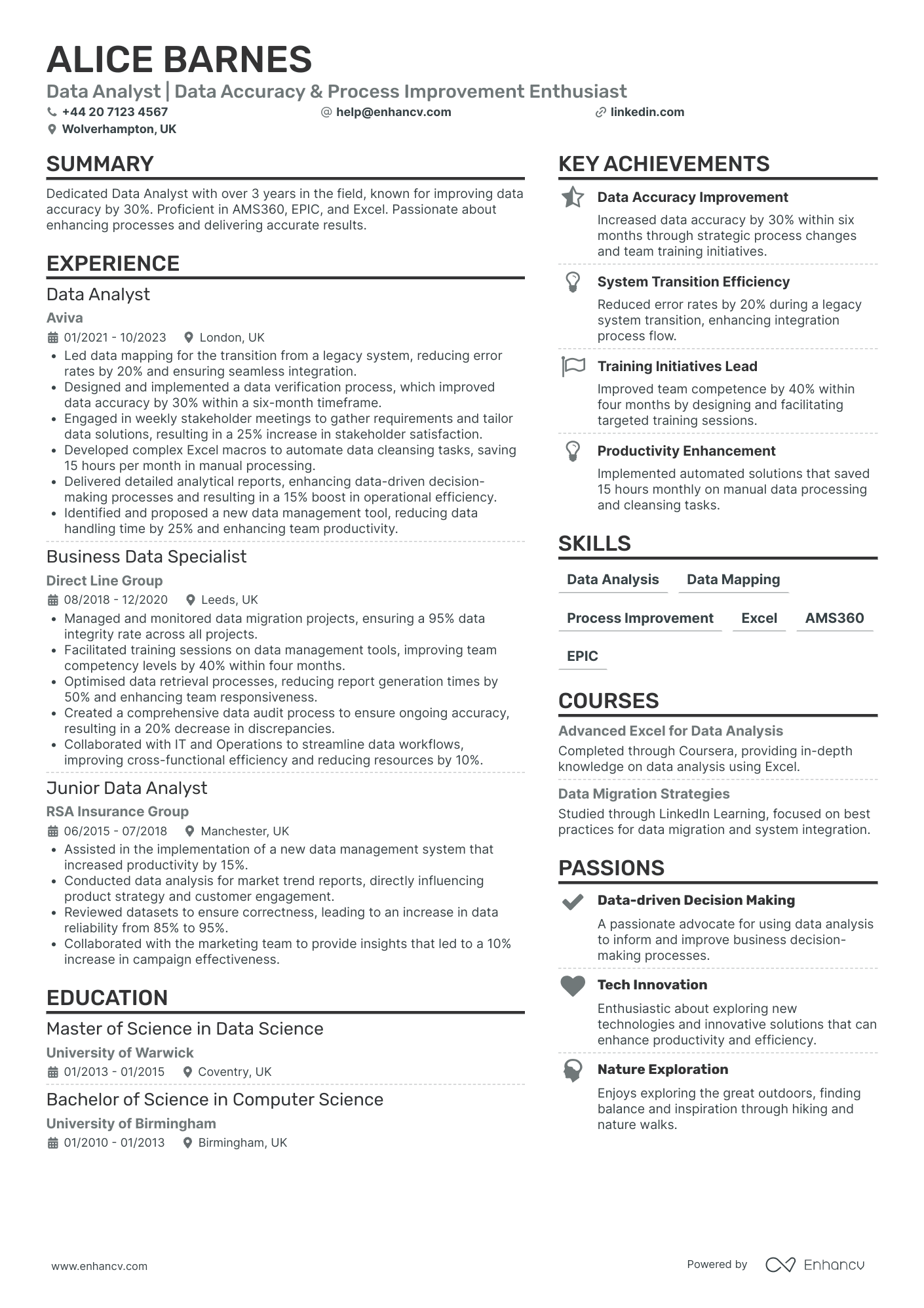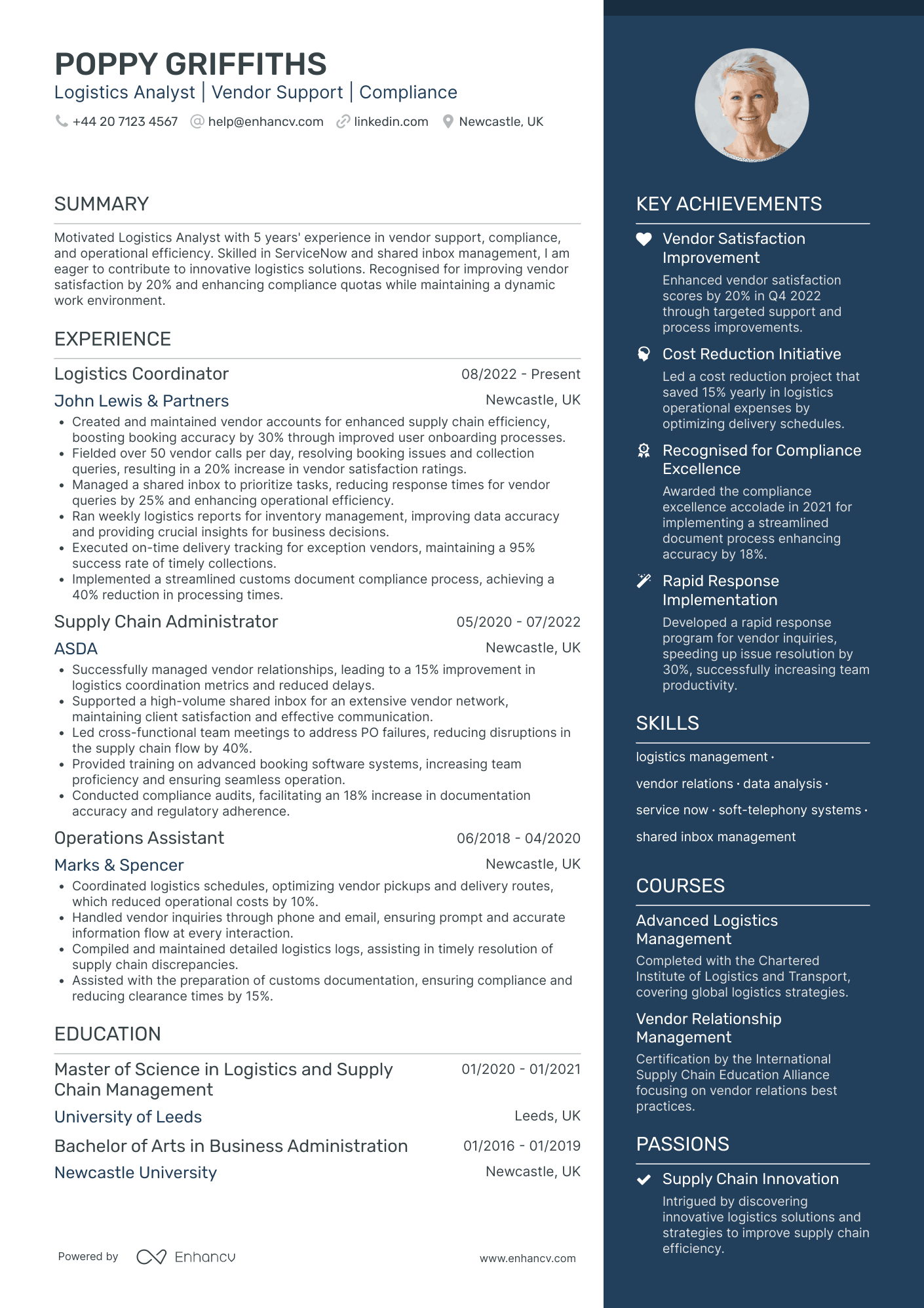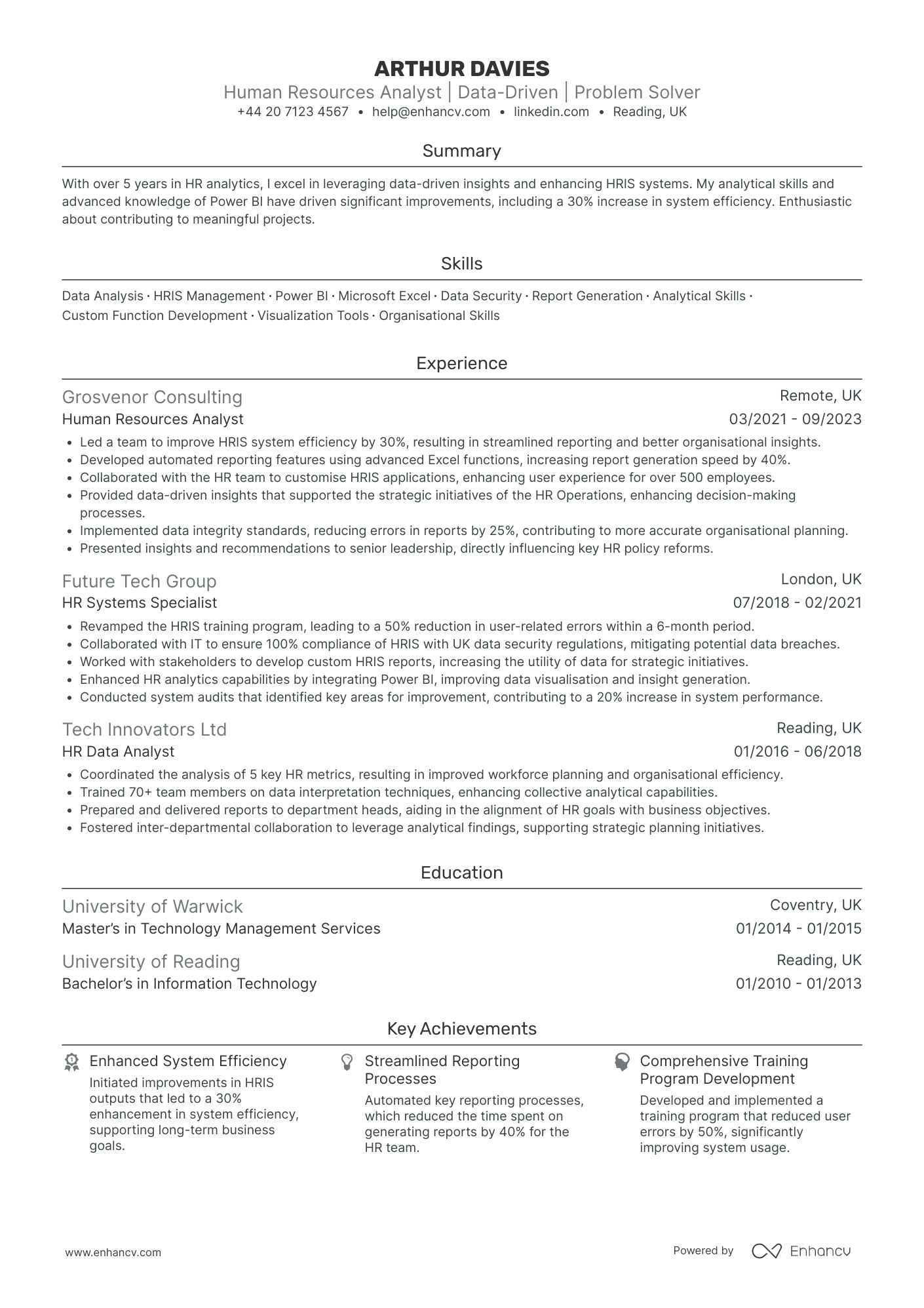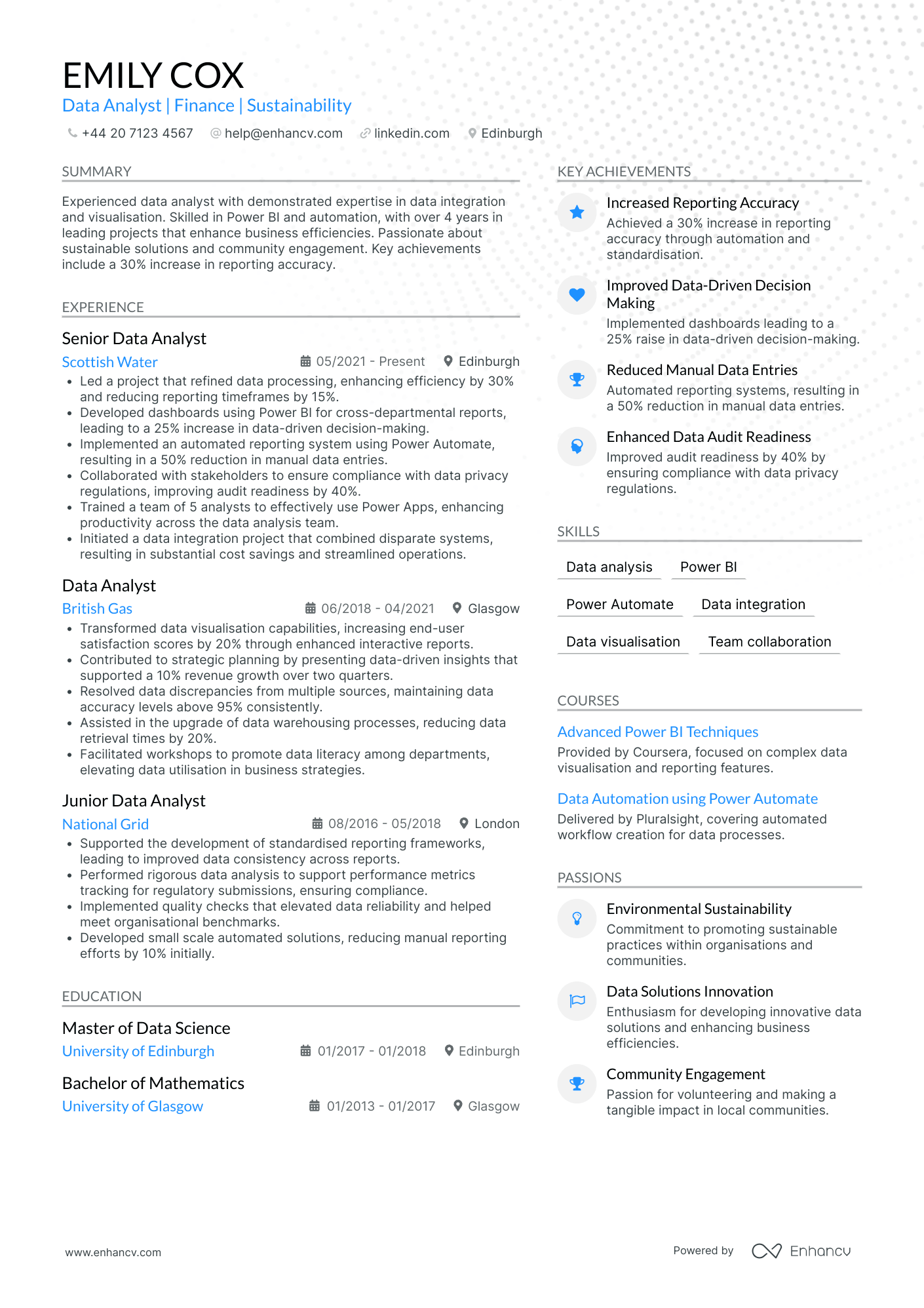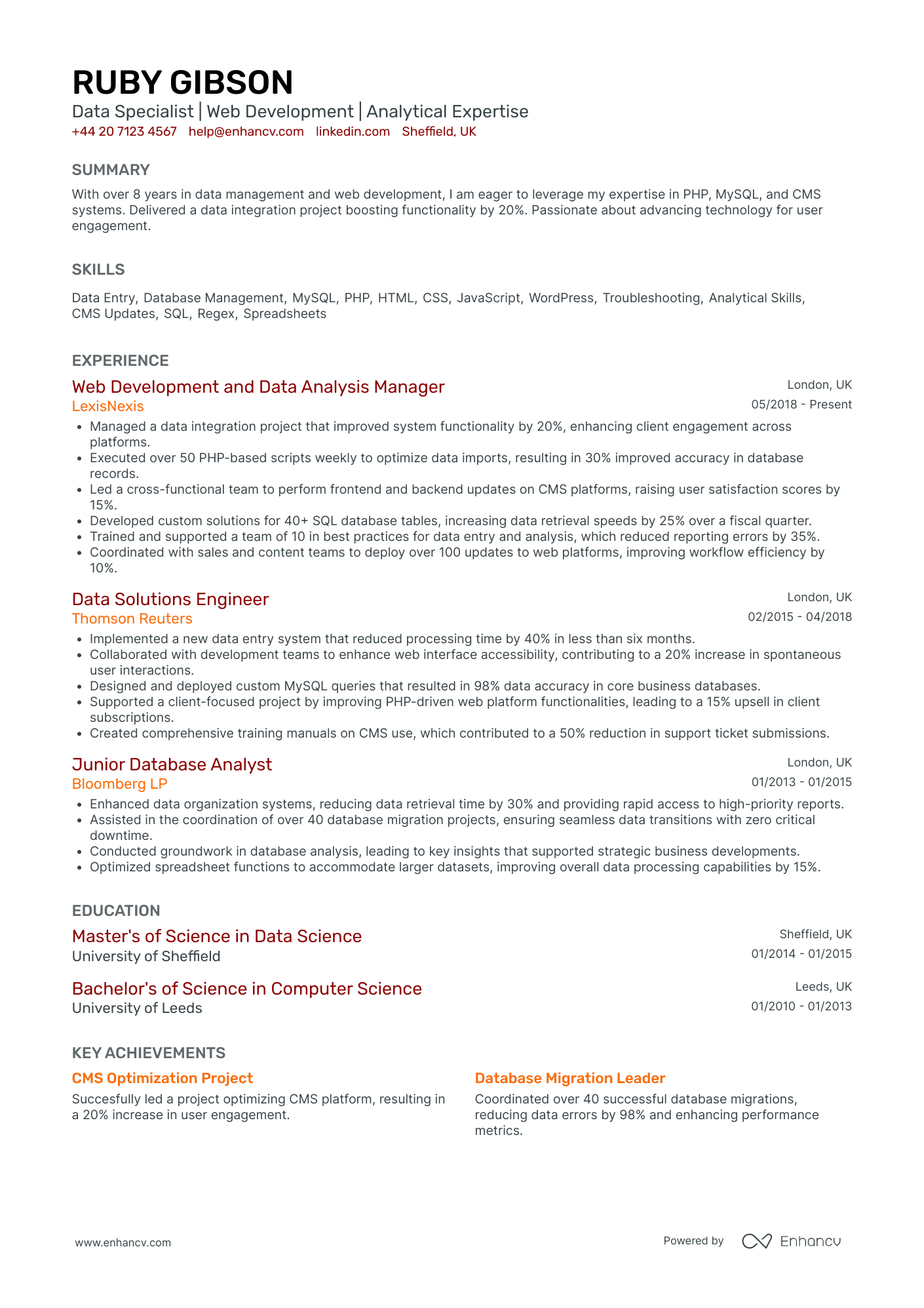One CV challenge you may encounter as an entry-level data analyst is effectively showcasing relevant skills and experiences in a way that stands out to potential employers. Our guide provides tailored advice and practical examples to help you accentuate your analytical proficiencies and academic achievements, ensuring your application makes a memorable impression.
- Answer job requirements with your data analyst entry level CV and experience;
- Curate your academic background and certificates, following industry-leading CV examples;
- Select from +10 niche skills to match the ideal candidate profile
- Write a more succinct experience section that consists of all the right details.
Do you need more specific insights into writing your data analyst entry level CV? Our guides focus on unique insights for each individual role:
Resume examples for data analyst entry level
By Experience
Junior Data Analyst
- Content Presentation with Structural Clarity - The CV is well-organized, presenting each section distinctly, which enhances readability and ensures that the recruiter can quickly access key information. Bullet points effectively break down responsibilities and achievements, allowing for concise yet informative content. This clear structure helps convey the candidate's qualifications in an orderly, easily digestible format, crucial for catching the eye of hiring managers in data analytics roles.
- Career Trajectory and Growth in Data Analytics - Freddie Hughes’s career path demonstrates a steady and logical progression within the field of data analytics, from intern to junior analyst. This trajectory showcases growing responsibility and expertise, especially noteworthy in the transition from supporting roles to leading initiatives that resulted in measurable business outcomes. The progression reflects Hughes's commitment to development within a competitive industry, critical for a data-driven career.
- Achievements and Business Impact - Noteworthy are the CV's highlighted achievements, each substantiated with specific statistical outcomes such as increased efficiency, customer engagement, and ROI. These achievements go beyond mere numerical claims to illustrate significant business impacts, underscoring the candidate's ability to drive strategic improvements within an organization. Such accomplishments are vital for demonstrating tangible contributions to potential employers.
Trainee Data Analyst
- Structured Content Presentation - The CV is meticulously organized, presenting information in a clear and concise manner. Each section is logically arranged, beginning with personal and contact information, followed by a well-crafted summary. The employment history is laid out chronologically, making it easy to follow the candidate's career trajectory and achievements. This structured approach ensures that prospective employers can quickly grasp the key aspects of Eva’s professional profile.
- Career Growth with Industry Focus - Eva Fisher's career progression demonstrates significant growth within the healthcare insurance analytics sector. Starting as a Junior Data Analyst at Cigna, she advanced to a Business Analyst role at AXA before becoming a Data Analyst at Bupa. This trajectory not only signifies promotions and increased responsibilities but also reflects a deepening specialization in health data and related analytical tasks. Her career choices exhibit a clear focus on continued development within her chosen industry.
- Industry-Specific Technical Proficiency - The CV highlights Eva's proficiency with industry-relevant tools and methodologies, particularly her expertise in R programming—a critical skill for data analysis in health statistics. Her coursework, including an advanced R Programming course from DataCamp and a Coursera specialization in Health Data Science, underscores her commitment to technical mastery. Moreover, her achievements with automating pricing systems and improving data accuracy emphasize her ability to apply these technical skills effectively to solve real-world business challenges.
Graduate Data Analyst
- Concise and Well-Structured Presentation - The CV is laid out in a clear and concise manner, making it easy for recruiters to navigate through the key information. Each section is clearly delineated, and the use of bullet points allows for quick identification of major achievements and roles, ensuring that the most critical aspects of Grace's experience and skills are readily accessible.
- Progression in Business Change Roles - Grace's career trajectory showcases a steady progression within the field of business change analysis. Starting as a Business Analyst Assistant at Aviva, and advancing to Junior Change Analyst at Mercer, and finally to a full-fledged Business Change Analyst at Willis Towers Watson, her path reflects a significant growth in responsibility and expertise, underscoring a strong upward career momentum.
- Proven Impact in Process Improvement and Cost Reduction - The CV includes concrete examples of achievements that indicate Grace's ability to drive substantial business improvements. With a track record of implementing strategies that led to a 20% efficiency gain and identifying £50,000 in cost savings, these accomplishments are not mere numbers but represent meaningful contributions to company performance and financial health.
By Role
Data Analyst Entry Level for Business Intelligence
- Effective use of structured sections for ease of comprehension - The CV employs a well-organized structure, utilizing clear headings and subsections, such as "Experience," "Education," and "Skills," to ensure readers can easily locate key information. The bullet points further enhance readability by succinctly summarizing responsibilities and achievements.
- Demonstrates steady career progression and specialization - The candidate shows a clear career trajectory from Customer Service Specialist to Customer Success Executive, reflecting growth and promotions within the industry. The focus gradually shifts towards food technology, showcasing a specialist's role alongside broader client relations expertise.
- Inclusion of industry-specific projects and methodologies - The CV highlights distinct projects such as food waste reduction initiatives, which align well with the food tech industry. It emphasizes specific methodologies and tools used to achieve substantial results, underscoring technical depth and a commitment to sustainability in food practices.
Data Analyst Entry Level for Data Science
- Clear and Structured Presentation - The CV is organized in a manner that offers immediate insights into the candidate's qualifications and experiences. Sections such as experience, education, and skills are clearly delineated, making it easy to identify key information swiftly. The use of bullet points throughout allows for a concise presentation of complex data, enhancing the clarity of conveyed achievements and responsibilities.
- Strong Career Trajectory and Industry Relevance - Harry Williams demonstrates a solid career progression with positions that increasingly incorporate leadership and strategic responsibilities. Transitioning from a Market Analyst at Lloyds Banking Group to a Data Analyst at HSBC illustrates both growth in the field and the ability to handle more complex data-driven roles. His experience across different banking institutions indicates a strong, industry-focused career path.
- Impactful Achievements and Business Relevance - The accomplishments listed are not only quantified with percentages but are also tied directly to business outcomes like market positioning improvements and increased customer engagement. For example, a 25% increase in customer satisfaction and significant boosts in campaign success rates highlight the candidate's ability to impact the business positively in tangible ways, adding immense value to any potential employer.
Data Analyst Entry Level for Data Engineering
- Structured and Clear Presentation - Amelia Murphy's CV is well-organized, providing a clear structure with distinct sections for experience, education, skills, and achievements. This allows a recruiter to easily navigate and assess her qualifications, expertise, and contributions at a glance, making it concise and targeted towards a Data Analyst role.
- Demonstration of Career Growth and Leadership - The CV effectively highlights Amelia's career progression from a Data Analyst at Aon UK to becoming a Data Management Lead at Munich Re. This progression reflects her growth in responsibility and leadership, showcasing her ability to lead projects, negotiate with partners, and improve business processes, crucial traits for higher-level analytics positions.
- Strong Technical Proficiency in Industry-Specific Tools - Amelia demonstrates deep technical knowledge with an array of industry-specific tools and methodologies such as Power BI, SQL, Spark, and Databricks. This expertise not only underscores her analytical proficiency but also her capability to implement and optimize these technologies for effective data management and process improvement within the insurance sector.
Data Analyst Entry Level for Market Research
- Clarity and Structure in Content Presentation - The CV excels in presenting information clearly and concisely, organized under specific headings such as experience, education, skills, and achievements. Each section is crafted to facilitate easy navigation, ensuring the recipient can quickly grasp the candidate's qualifications and career progression.
- Adaptability and Cross-Functional Experience - Poppy Griffiths has demonstrated significant adaptability by successfully navigating roles in different companies like LinkedIn, ZoomInfo, and Google, each with their unique operational dynamics. Her ability to integrate CRM systems and database solutions across various settings illustrates her versatile skill set and cross-functional expertise.
- Achievements and Their Business Impact - The CV highlights numerous achievements with direct business relevance, such as enhancing efficiency by 20% and improving customer engagement by 30% through advanced CRM strategies. These metrics not only underscore her technical ability but also her capacity to deliver tangible, impactful results that align with business goals.
Data Analyst Entry Level for Operations Research
- Clear and Concise Content Presentation - The CV is structured in a clear and coherent manner, starting with contact information followed by a succinct summary of skills and experience. Each job role is detailed with specific achievements, making the candidate's capabilities easily understandable at a glance. The use of bullet points aids in readability and quick reference to critical accomplishments.
- Progressive Career Trajectory - Alice Barnes showcases a strategic career progression from a Junior Data Analyst to a Data Operations Analyst at reputable firms like Bloomberg LP and Jane Street. Each role demonstrates advancements in responsibilities, particularly in data management and system optimization, reflecting her growing expertise and commitment to the field of data analysis and engineering.
- Significant Technical Proficiency - The CV highlights advanced technical skills, particularly proficiency in Python and SQL Server, as well as expertise in AWS and Linux systems. These skills, combined with her education in data science and computer science from top universities, underline her capability to handle complex data engineering tasks and drive efficient data solutions.
Data Analyst Entry Level for Quality Assurance
- Strategic career progression - Charlie's career trajectory reveals a strategic move from Data Coordinator to Data Analyst, showcasing growth in responsibilities and skill application. This demonstrates not just expanding expertise in data management but also a deliberate pursuit of roles that build on past experiences for greater impact.
- Technical prowess with advanced tools - The CV clearly highlights Charlie’s proficiency with essential analytical tools like Excel, SQL, and data visualization techniques, which are crucial for complex data analysis tasks. This expertise is further complemented by additional courses in advanced data visualization and SQL, underscoring a commitment to maintaining cutting-edge technical skills.
- Impactful achievements - The CV shines by detailing significant achievements such as cutting reporting time and improving decision-making speed through effective dashboard redesigns and SQL query optimizations. These accomplishments are presented with clear, quantifiable outcomes, emphasizing their direct business impact and value.
Data Analyst Entry Level for Project Management
- Structured presentation of skills and achievements - The CV is meticulously organized, presenting information in a clear and concise manner, which highlights Max's proficiency in data analysis tools and methodologies. This structure not only enhances readability but ensures that key competencies and accomplishments are immediately apparent to the reader.
- Consistent career progression in data-focused roles - Max's career path demonstrates a steady progression from a Data Coordinator to a Data Analyst, illustrating both growth and deepening expertise within the data analytics and migration space. The transitions between roles reflect an increasing level of responsibility and impact, culminating in leading significant data migration projects.
- Application of industry-specific tools and processes - With a substantial emphasis on technical skills, the CV highlights Max's adept use of SQL, Excel, Power BI, and Tableau. These tools are critical in the data analytics industry, demonstrating Max's technical depth and practical application of these skills in improving operational efficiency and data accuracy.
By Industry
Data Analyst Entry Level in Financial Services
- Clear and well-organized structure - The CV presents information in a clean, logical manner, starting with a concise professional summary that quickly establishes the applicant's expertise and experience in finance. Each section is thoughtfully organized, with bullet points used effectively to highlight key achievements and responsibilities, ensuring the content is both readable and easy to navigate.
- Significant career progression in reputable institutions - The candidate demonstrates a strategic career trajectory, progressing from a Market Operations Analyst to a Derivatives Confirmations Analyst position in prestigious banking institutions like Lloyds, HSBC, and Barclays. This progression indicates a strong record of performance, increasing responsibilities, and adaptability to complex financial environments.
- Impressive achievements with industry impact - The CV stands out by quantifying the impact of the candidate's efforts, such as reducing errors by 30% with a new confirmation system and achieving a 20% increase in client retention. These achievements highlight the candidate's ability to not only implement changes effectively but also drive significant business improvements that enhance overall operational efficiency and client satisfaction.
Data Analyst Entry Level in Healthcare
- Demonstrates a clear career path in healthcare data analysis - The CV highlights William's progressive growth within the healthcare and data analysis field. Starting as a Market Data Coordinator, he subsequently advanced to a Research Analyst role and is now a Data Analyst at Healthcare IQ. This progression showcases his expanding responsibilities and competence in handling complex data-related tasks across respected organizations in the healthcare sector.
- Effectively showcases unique industry-specific skills - William's expertise in key data analysis tools and methodologies is evident throughout the CV. He demonstrates proficiency in Excel, SQL, and Power BI, which are crucial for data manipulation and analysis within the healthcare industry. Additionally, his capability to enhance data processing tools and perform competitive pricing analysis reflects his technical depth and understanding of industry-specific requirements.
- Highlights impactful achievements with business relevance - The CV not only includes quantitative achievements but also communicates their significant impact on business objectives. For instance, William's role in reducing equipment costs by 15% and saving clients £200K annually exemplifies his contribution to operational savings and cost efficiency within healthcare organizations. These achievements underscore the practical benefits of his analytical skills in real-world business scenarios.
Data Analyst Entry Level in IT
- Career Path Highlighting Environmental Focus - Throughout Lily Cooper's career trajectory, there is a clear progression from a Junior Data Analyst to Data Analyst with increasing responsibilities that align with environmental justice goals. The transition between each role is marked by significant achievements that not only benefited her employers but also contributed to her growth in the environmental sector.
- Distinct Use of Industry-Specific Software - The CV emphasizes Cooper's proficiency with industry-standard tools like GIS and Tableau, critical for data visualisation in environmental contexts. Her capability in these areas complements her skills in more general data analysis and programming languages such as Python and SQL, demonstrating both depth and breadth in technical competences relevant to the field.
- Leadership and Collaboration Acumen - Cooper showcases robust leadership qualities and teamwork experiences, managing a team of four analysts and initiating cross-functional projects. Her ability to lead workshops and improve team competencies further indicates strong interpersonal skills and a commitment to fostering collaborative work environments.
Data Analyst Entry Level in Marketing
- Strategic Use of Industry Tools - Lily Cooper's CV impressively highlights her proficiency with vital tools like Salesforce and Pardot, showcasing how she has leveraged these platforms for CRM optimization and marketing analysis. Her technical depth is evident through the initiatives and integrations she has led, notably increasing lead conversion rates and campaign tracking efficiency.
- Career Growth and Industry Experience - Over the course of her career, Lily has effectively advanced from a Marketing Data Specialist at JP Morgan to her current role of Sales and Marketing Data Analyst at Fidelity Investments. This trajectory reveals her strong capacity for growth and her ability to adapt to more complex roles within the financial services industry.
- Significant Achievements and Business Impact - The CV details numerous impactful achievements which underscore her business relevance, such as automating reporting processes to save valuable time and reducing PPC costs while boosting ROI. These accomplishments not only demonstrate her technical prowess but also her dedication to driving value and efficiency in business operations.
Data Analyst Entry Level in Retail
- Clear and Structured Content Presentation - The CV is well-organized, providing clarity through distinct sections such as education, experience, skills, and achievements. This structure ensures that the reader can quickly locate pertinent information about Freya Richardson's qualifications and expertise.
- Progressive Career Trajectory in Cyber Security - Freya's career path shows a steady progression from an IT Support Analyst role to her current position as a Junior Security Operations Analyst. Her work experience in renowned firms like Deloitte and BT Group indicates a clear dedication to advancing within the field of cyber security.
- Emphasis on Industry-Specific Tools and Methodologies - The CV highlights Freya's proficiency with advanced SIEM technologies, threat analysis, and forensic data analysis, showcasing her technical depth. This is further augmented by her specific focus on security operations centers (SOCs), reflecting her industry-specific acumen.
Data Analyst Entry Level in Manufacturing
- Structured Clarity in Presentation - The CV neatly organizes information under clear headings such as "Experience," "Education," and "Skills," catering to easy navigation and comprehension. Each section is concisely written, ensuring all crucial details are conveyed without overwhelming the reader, making it highly effective for hiring managers to extract relevant information quickly.
- Linear Career Progression - Alice's career trajectory reflects logical and strategic growth within the data analytics field, rising from a Junior Data Analyst to a more senior Data Analyst role. This progression indicates a deepening of expertise and the acquisition of responsibilities, highlighting her continuous development and commitment to her professional advancement in data handling and analysis.
- Impactful Achievements with Business Relevance - The CV underscores Alice's impact through achievements that go beyond numbers to show real business benefits, such as improved stakeholder satisfaction by 25% and increased operational efficiency by 15%. This focus on the practical implications of her work emphasizes her ability to drive performance improvements and adds weight to her profile as a results-oriented professional.
Data Analyst Entry Level in Logistics
- Content presentation and structure - The CV is well-organized with clearly defined sections such as experience, education, skills, and achievements. Each role includes concise bullet points that highlight key responsibilities and accomplishments, making it easy to quickly assess the candidate’s capabilities and track record in logistics and supply chain management.
- Career trajectory and growth - Poppy Griffiths demonstrates a steady career progression, beginning as an Operations Assistant and advancing to Logistics Coordinator. Each step reflects growth in responsibility and expertise, from handling logistics schedules to improving vendor satisfaction and reducing processing times. Her educational background in logistics and supply chain further complements this upward career trajectory.
- Soft skills and leadership - The candidate exhibits strong soft skills such as time management, vendor relations, and cross-functional collaboration. These are evident through achievements like spearheading a 40% reduction in supply chain disruptions and enhancing team proficiency through training. Poppy Griffiths’ leadership in creating efficient processes showcases her ability to lead teams and drive significant improvements.
Data Analyst Entry Level in Human Resources
- Structured Progression and Career Growth - The career trajectory detailed in the CV showcases a clear path of advancement within human resources analytics, moving from an HR Data Analyst to an HR Systems Specialist, then to a Human Resources Analyst. This demonstrates not only expertise but a deepening of responsibilities over time, indicating career dedication and the ability to handle increasingly complex tasks.
- Emphasis on Technical Proficiency and Tool Utilization - Arthur’s CV underlines significant expertise with industry-specific tools and methodologies, particularly in using Power BI for data visualization and insight generation. The technical depth is further highlighted by achievements in HRIS system efficiency and automated reporting processes, setting the groundwork for impactful data-driven decision-making.
- Cross-Functional Collaboration - The CV illustrates Arthur’s capability to work across various teams and departments, enhancing HRIS systems and participating in strategic planning initiatives. This adaptability in engaging with stakeholders and IT teams speaks to his strengths in problem-solving and improving operational processes, critical for a role that requires integration of data insights with human resources strategies.
Data Analyst Entry Level in Education
- Structured and Clear Presentation - The CV is well-organized, presenting information in a concise and clear manner. Each section flows logically, allowing quick access to relevant details such as education, skills, and career achievements. This structure ensures readability, making it easy for potential employers to pinpoint key qualifications and experiences related to the role.
- Diverse Career Progression - Emily Cox’s career path illustrates steady growth, transitioning from a Junior Data Analyst to a Senior Data Analyst at reputable companies. Throughout her tenure, she shifts between different industries, from energy at National Grid to utilities at Scottish Water, showcasing her adaptability and consistent upward trajectory.
- Notable Achievements with Business Impact - The CV emphasizes significant accomplishments, such as improving reporting accuracy and reducing manual data entries, which directly translate into increased operational efficiency. These achievements not only demonstrate technical proficiency but also their broader impact on organizational performance and strategic decision-making.
Data Analyst Entry Level in Government
- Clarity and Consistent Structure - The CV is meticulously structured, providing clear sections for experience, education, skills, and achievements. This format facilitates quick access to specific information, ensuring that both technical expertise and career progress are easily identifiable.
- Progressive Career Trajectory - Ruby's career exhibits significant growth from a Junior Database Analyst to a managerial role in Web Development and Data Analysis. The steady climb through reputable companies like Bloomberg LP, Thomson Reuters, and LexisNexis underscores her increasing responsibility and expertise in the data and web sectors.
- Impactful Business Achievements - The CV is rich with quantifiable accomplishments that demonstrate tangible business impacts, such as a 20% improvement in system functionality and a 15% increase in user satisfaction scores. These metrics speak volumes about her capability to harness technological solutions to drive business success.
Structuring your data analyst entry level CV layout: four factors to keep in mind
There are plenty of best practices out there for your CV layout and design. At the end of the day, a clear format and concise CV message should be your top priority. Use your CV design to enhance separate sections, bringing them to the forefront of recruiters' attention. At the same time, you can write content that:
- Follows the reverse chronological order in the experience section by first listing your most recent jobs;
- Incorporates your contact information in the header, but do skip out on the CV photo for roles in the UK;
- Is spotlighted in the most important sections of your CV, e.g. the summary or objective, experience, education, etc. to show just how you meet the job requirements;
- Is no longer than two-pages. Often, the one-page format can be optimal for your data analyst entry level CV.
Before submitting your CV, you may wonder whether to export it in Doc or PDF. With the PDF format, your information and layout stay intact. This is quite useful when your CV is assessed by the Applicant Tracker System (or the ATS) . The ATS is a software that scans your profile for all relevant information and can easily understand latest study on the ATS , which looks at your CV columns, design, and so much more.
PRO TIP
Use font size and style strategically to create a visual hierarchy, drawing the reader's eye to the most important information first (like your name and most recent job title).
The top sections on a data analyst entry level CV
- Contact Information ensures the recruiter can reach you.
- Professional Summary showcases your career focus and goals.
- Technical Skills highlights analytical tools you're proficient in.
- Educational Background proves you have the necessary theoretical knowledge.
- Relevant Experience demonstrates practical data analysis experience.
What recruiters value on your CV:
- Highlight your expertise in statistical analysis and programming languages such as R, Python, SQL or SAS, showcasing any relevant projects or coursework that demonstrates your hands-on experience with data manipulation and analysis.
- Emphasise your proficiency in data visualisation tools like Tableau or Power BI, and include examples of dashboards or reports you've created to convey complex data in an accessible way.
- Show your knowledge of data cleaning and preprocessing, detailing any experience you have in handling large datasets and using techniques to ensure data quality and integrity.
- Outline your problem-solving skills by describing scenarios where you've applied analytical methods to gather insights from data, leading to actionable recommendations or decisions.
- Include any certifications or training courses relevant to data analytics, such as Google Data Analytics Professional Certificate or courses in big data platforms like Hadoop, to demonstrate a continuous commitment to learning.
Recommended reads:
Our checklist for the must-have information in your data analyst entry level CV header
Right at the very top of your data analyst entry level CV is where you'd find the header section or the space for your contact details, headline, and professional photo. Wondering how to present your the name of the city you live in and the country abbreviation as your address;
- are tailored to the role you're applying for by integrating key job skills and requirements;
- showcase what your unique value is, most often in the form of your most noteworthy accomplishment;
- select your relevant qualifications, skills, or current role to pass the Applicant Tracker System (ATS) assessment. Still not sure how to write your CV headline? Our examples below showcase best practices on creating effective headlines:
Examples of good CV headlines for data analyst entry level:
- Graduate Data Analyst | MSc Applied Statistics | Passionate in Machine Learning | SQL Proficient
- Junior Data Analyst | BSc Computer Science | Data Visualisation Expert | Python & R Skilled
- Entry-Level Data Analyst | Marketing Analytics Experience | Strong in Excel | Tableau Certified
- Aspiring Data Scientist | Recent Data Analysis Intern | Big Data Enthusiast | Advanced Analytics
- Data Insight Analyst | 1-year Hands-on Experience | Specialising in Financial Data | BI Tools User
- Business Data Analyst | Economics Graduate | CRM Data Mining | SQL & PowerBI Experienced
Your data analyst entry level CV introduction: selecting between a summary and an objective
data analyst entry level candidates often wonder how to start writing their resumes. More specifically, how exactly can they use their opening statements to build a connection with recruiters, showcase their relevant skills, and spotlight job alignment. A tricky situation, we know. When crafting you data analyst entry level CV select between:
- A summary - to show an overview of your career so far, including your most significant achievements.
- An objective - to show a conscise overview of your career dreams and aspirations.
Find out more examples and ultimately, decide which type of opening statement will fit your profile in the next section of our guide:
CV summaries for a data analyst entry level job:
- As a recent graduate with a First Class Honours in Data Science from the University of Cambridge, I bring a comprehensive knowledge of analytics tools including SQL, Python, and Tableau, combined with a six-month internship experience at a top tech firm, where I significantly reduced data processing times by 20% through optimised queries.
- Boasting a Master's degree in Statistics and a 1-year data analysis apprenticeship within a dynamic fintech startup in London, I excelled in developing machine learning algorithms that enhanced predictive modelling accuracy by 15%, making me adept at turning data into actionable insights using R, Python, and Excel.
- Transitioning from a career in healthcare, where I accumulated 5 years of experience working with complex patient data sets, I am poised to leverage my analytical acumen and knowledge of statistical tools like SPSS to drive data-driven decision making in a new industry.
- With an established 7-year tenure as a financial analyst and a recent passion-driven self-education in data analytics, including completing an intensive bootcamp on SQL, Python, and Power BI, I’m ready to apply my quantitative skills and exceptional attention to detail to uncover insights in large datasets.
- Seeking an entry-level opportunity to utilise my strong foundation in mathematics and my commitment to learning, which I demonstrated by completing several online courses in data analytics, including an Advanced Excel certification. Eager to contribute to, and grow with, a team that values data-driven strategies.
- Aiming to kickstart my career in data analysis armed with a BSc in Computer Science from Imperial College London, and a passion for interpreting and visualising data. Dedicated to mastering the tools and techniques needed to uncover hidden patterns and supply transformative business intelligence.
How to meet job requirements with your data analyst entry level CV experience
We've now reached the essence of your actual CV - your experience section. This is the space where you can list your career roles and on-the-job successes. Many candidates tend to underestimate just how much time and effort they should put into writing this CV section. Your experience shouldn't be a random list of your responsibilities, but instead:
- Match the job description with your skills, values, and accomplishments;
- Start each bullet with a strong action verb, followed up with one key skill and your outcome of applying this skill;
- Spotlight parts of your career history that are relevant to the job you're applying for.
Before we move on, make sure to check out some professional CV experience sections.
Best practices for your CV's work experience section
- Analysed large datasets using SQL, improving data retrieval efficiency by 15%, enabling faster decision-making.
- Utilised Python and R for statistical analysis, identifying trends and patterns that informed strategic business choices.
- Developed interactive dashboards with Tableau, enhancing data visualisation and effectively communicating insights to non-technical stakeholders.
- Assisted in the design and implementation of A/B testing, providing data-driven recommendations that increased user engagement by 20%.
- Conducted thorough data cleaning and pre-processing, ensuring a 98% accuracy level in subsequent analytic processes.
- Participated in cross-functional teams to solve complex business problems, translating analytical findings into actionable strategies.
- Performed predictive modelling using machine learning algorithms, projecting sales trends and informing inventory management.
- Maintained meticulous documentation of all data analysis processes, establishing a knowledge base for future reference and onboarding.
- Collaborated with IT to troubleshoot and optimize the data warehousing environment, ensuring robust data infrastructure and security.
- Managed extensive analysis of large datasets using SQL and Excel, providing detailed monthly reports on market trends which informed strategic decision-making.
- Lead a project that integrated data from multiple sources, enhancing the accuracy of predictive models used in inventory management and increasing efficiency by 20%.
- Designed and implemented an automated reporting system using Python, drastically reducing the time spent on data compilation and increased team productivity by 30%.
- Executed daily data cleansing and validation processes, ensuring a high level of accuracy for downstream analysis impacting key business initiatives.
- Developed and maintained dashboards in Tableau that tracked KPIs across several business units, leading to a better understanding of performance drivers.
- Collaborated with cross-functional teams on a market segmentation study that identified potential growth areas, increasing lead generation by 25%.
- Pioneered a new approach to analysing customer feedback data using NLP techniques, which uncovered insights leading to a 10% improvement in customer satisfaction scores.
- Facilitated data-driven decision-making by performing regression analysis to predict sales trends, which helped adjust marketing spend accordingly.
- Participated in the rollout of a CRM system by migrating and harmonising historical data, which resulted in improved data quality and accessibility for the marketing team.
- Developed financial models and analyses to evaluate various strategic scenarios, directly contributing to an increase of 15% in annual revenue.
- Conducted a comprehensive cost-benefit analysis for new product introductions, which played a pivotal role in selecting the most profitable product mix.
- Automated the extraction and transformation of financial data from multiple systems using ETL tools, slashing report generation time by 40%.
- Interpreted complex data sets relating to customer demographics, enabling the marketing team to tailor campaigns to target audiences effectively.
- Instrumental in the development of a churn prediction model that utilised machine-learning algorithms, reducing customer churn by 12%.
- Presented data insights clearly to non-technical stakeholders via interactive dashboards, fostering a culture of data-driven decision-making in the company.
- Implemented A/B testing on the company website and analysed user engagement data, which resulted in optimising the user interface and increasing conversions by 17%.
- Conducted logistic regression analyses to understand the factors influencing customer retention, directly informing retention strategy tactics.
- Supported the sales team by providing ad-hoc reporting and analysis that revealed sales opportunities, contributing to a 10% increase in quarterly sales.
- Streamlined the process of data collection from software application logs, allowing for real-time analysis of user interactions and system performance.
- Developed a predictive model using Python and Scikit-learn to forecast inventory needs, enabling a just-in-time inventory system that reduced waste by 18%.
- Prepared and presented in-depth analysis reports which influenced the redesign of critical features, improving user satisfaction metrics by 22%.
- Analysed online customer behaviour and conversion data to gain insights into website performance, leading to a redesign that increased visitor engagement by 35%.
- Managed tagging and tracking of digital marketing campaigns using Google Analytics, resulting in a more targeted approach and a 20% increase in marketing ROI.
- Implemented machine learning algorithms to segment customer data, informing personalisation strategies that lifted repeat purchase rates by 15%.
What to add in your data analyst entry level CV experience section with no professional experience
If you don't have the standard nine-to-five professional experience, yet are still keen on applying for the job, here's what you can do:
- List any internships, part-time roles, volunteer experience, or basically any work you've done that meets the job requirements and is in the same industry;
- Showcase any project you've done in your free time (even if you completed them with family and friends) that will hint at your experience and skill set;
- Replace the standard, CV experience section with a strengths or achievements one. This will help you spotlight your transferrable skills that apply to the role.
Recommended reads:
PRO TIP
Describe how each job helped you grow or learn something new, showing a continuous development path in your career.
Key data analyst entry level CV skills: what are hard skills and soft skills
Let's kick off with the basics. You know that you have to include key job requirements or skills across your CV. For starters, take individual skills from the job description and copy-paste them into your CV, when relevant. Doing so, you'll ensure you have the correct skill spelling and also pass the Applicant Tracker System (ATS) assessment. There are two types of skills you'll need to include on your CV:
- Hard skills - technical abilities that are best defined by your certificates, education, and experience. You could also use the dedicated skills section to list between ten and twelve technologies you're apt at using that match the job requirements.
- Soft skills - your personal traits and interpersonal communication skills that are a bit harder to quantify. Use various CV sections, e.g. summary, strengths, experience, to shine a spotlight on your workspace achievements, thanks to using particular soft skills.
Remember that your job-winning CV should balance both your hard and soft skills to prove your technical background, while spotlighting your personality.
Top skills for your data analyst entry level CV:
Data Analysis
Statistical Analysis
Data Visualization
SQL
Python
R
Microsoft Excel
Data Mining
Machine Learning
Database Management
Analytical Thinking
Problem-Solving
Attention to Detail
Communication
Time Management
Teamwork
Critical Thinking
Adaptability
Curiosity
Project Management
PRO TIP
Focus on describing skills in the context of the outcomes they’ve helped you achieve, linking them directly to tangible results or successes in your career.
Further professional qualifications for your data analyst entry level CV: education and certificates
As you're nearing the end of your data analyst entry level CV, you may wonder what else will be relevant to the role. Recruiters are keen on understanding your academic background, as it teaches you an array of hard and soft skills. Create a dedicated education section that lists your:
- applicable higher education diplomas or ones that are at a postgraduate level;
- diploma, followed up with your higher education institution and start-graduation dates;
- extracurricular activities and honours, only if you deem that recruiters will find them impressive.
Follow a similar logic when presenting your certificates. Always select ones that will support your niche expertise and hint at what it's like to work with you. Balance both technical certification with soft skills courses to answer job requirements and company values. Wondering what the most sought out certificates are for the industry? Look no further:
PRO TIP
Order your skills based on the relevance to the role you're applying for, ensuring the most pertinent skills catch the employer's attention first.
Recommended reads:
Key takeaways
Your successful job application depends on how you well you have aligned your data analyst entry level CV to the job description and portrayed your best skills and traits. Make sure to:
- Select your CV format, so that it ensures your experience is easy to read and understand;
- Include your professional contact details and a link to your portfolio, so that recruiters can easily get in touch with you and preview your work;
- Write a CV summary if you happen to have more relevant professional experience. Meanwhile, use the objective to showcase your career dreams and ambitions;
- In your CV experience section bullets, back up your individual skills and responsibilities with tangible achievements;
- Have a healthy balance between hard and soft skills to answer the job requirements and hint at your unique professional value.
